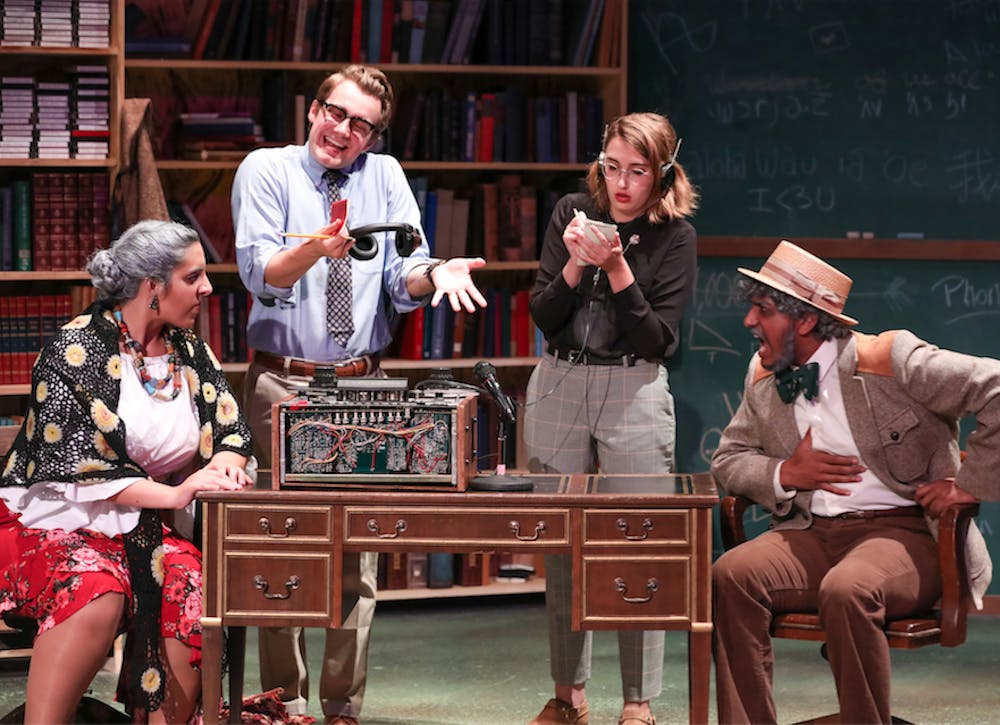The Language Archive is, naturally, all about dialogue.
The play, originally written by Julia Cho, will be coming to the Center for Dramatic Art on Oct. 11. Directed by Ashley Teague for the Kenan Theatre Company, the plot centers on George, a dedicated linguist whose life is turned upside down when his wife says she’s leaving him. What follows is a funny, often inspiring story that weaves together a large cast of side characters in scenes that rely heavily on witty conversation.
George, played by Jackson Campbell, is a great central character. Campbell portrays him as a neurotic, but sweet-natured man, and one who is clearly struggling with the recent changes in his life. It’s an endearing, funny performance that instantly makes you root for George, and Campbell excels at bouncing off of the other performers.
George’s practical and academic nature causes tension between him and his wife, Mary, played by Ash Heffernan. Heffernan delivers a soulful performance as a woman wondering if what she needs in life can only be found outside of her marriage. And even though we see her relationship with George in a time of extreme crisis, they clearly have shared a mutual love for many years. Their rich history being so immediately apparent is a testament to the performances, and Heffernan’s scenes with Campbell are awesome throughout.
Adding to the drama is Emma, played by Emma Scaggs. Emma, who works with George in his job as a linguist, seems unassuming at first, but she winds up having one of the play’s best arcs. Grappling with complex feelings for George, Emma breaks out of her “assistant” role and goes through a journey that fits in nicely with the play’s themes of self-discovery. Scaggs does a good job alternating between timidity and passion, and her great chemistry with Campbell gives the story a strong forward momentum.
If these three leads are relatively grounded and subdued characters, the colorful supporting cast seems at risk of overshadowing them, at least at first. Thankfully, each role turns out to be surprisingly nuanced, and the play finds three-dimensional humans inside even the most flamboyant personalities.
Alta and Resten, a bickering elderly couple played by Katie Distefano and Anish Pinnamaraju, are especially animated. Alta and Resten are the last people who can speak the dying language of Elloway, and they’re brought in by George and Emma to record and preserve their way of speaking. Their nationality is intentionally vague, and their accents are broadly “ethnic,” but Distefano and Pinnamaraju add enough small touches that they feel more like real people than caricatures. They also have some of the funniest scenes, and their relationship's subplot is fun and tender in its own right.
Olivia Herrera is hilarious as Emma’s language instructor, a theatrical character who is far more confident and outspoken than anyone else in the play. Also impressive is Andrew Linden, bringing dry humor to a small but important part as an old man who intersects with the main characters. His line delivery alone makes for perhaps the play’s funniest scene.
Great characters don’t necessarily mean a great plot, but The Language Archive has a charming and thematically rich narrative. While George is in love with the possibilities of language, the play is mostly concerned with its limits. Characters misunderstand each other, erupt in anger and sometimes struggle to say anything at all. These moments are usually played comically, but they reveal something interesting about how words can’t always communicate everything.



